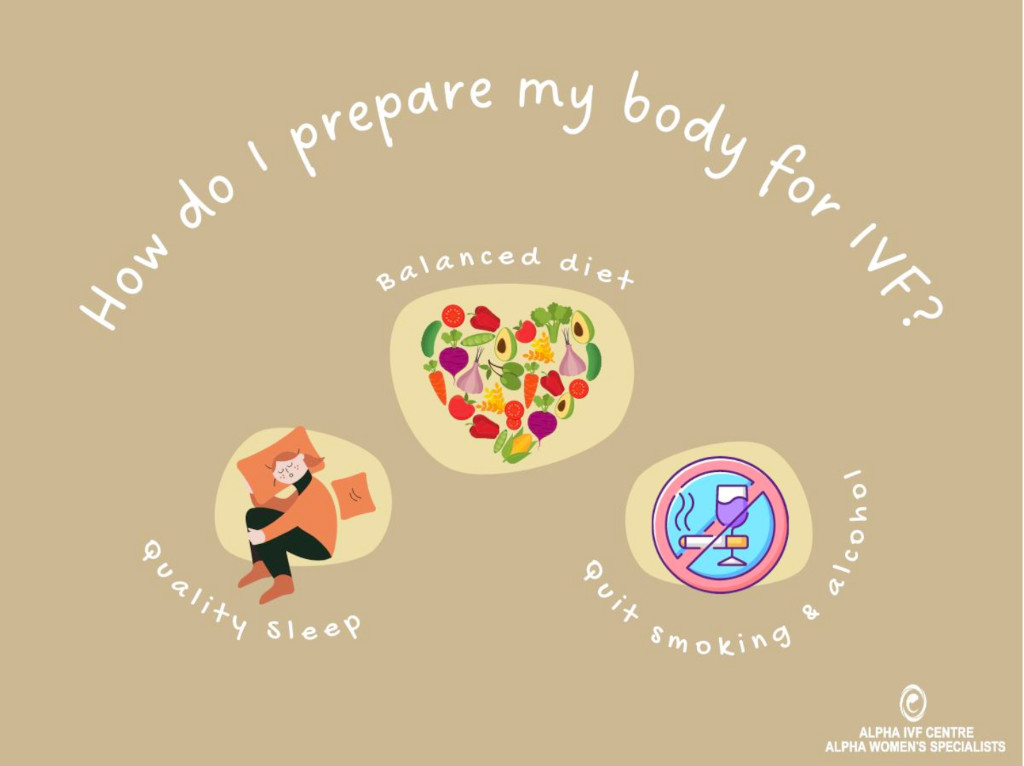How do I prepare my body for IVF treatment?
The overall condition of your body is important for maximizing your chances of a successful IVF outcome. There are several ways to prepare your body for IVF treatment.
Quit smoking and alcohol consumption
It is widely accepted that smoking affects IVF and ICSI outcomes. Smoking has adverse effect on maturation of follicles and endometrial receptivity [1]. Study has shown that smoking has negative influence on endometrial thickness on the day of embryo transfer which affects implantation and pregnancy rates during assisted reproduction technology (ART) treatment [2]. Alcohol consumption, even in moderate levels, can also affect ART outcomes negatively, decreasing the success with IVF treatment by decreasing oocyte yield and live birth rates [3]. Thus, it is always recommended to avoid smoking and alcohol use prior to initiating IVF treatment.
Maintain a healthy weight
Women with elevated body mass index (BMI) of ≥ 24kg/m2 showed lower response to the stimulation (decrease in number of follicles after stimulation) which resulted in lesser number of eggs collected [4]. It is recommended for women with high BMI to reduce their weight before embarking on IVF treatment.
Eat healthy and balanced diet
A healthy and well-balanced diet is essential for general well-being and for the body to function optimally. You can prepare your body by eating a good portion of vegetables and lean proteins.
Supplements
Your fertility doctor may suggest you to take supplements to improve your egg quality. They are often pre-natal vitamins that contain helpful elements such as folic acid, coenzyme, and omega-3s. Please inform your doctor if you are consuming any supplements or traditional herbs, as some of these may interact negatively with the fertility medications and potentially affect the treatment outcome.
Improve sleep quality
Sleep quality has an impact on oocyte quantity, oocyte maturity and embryo yield. A study has found that poor subjective sleep quality and having trouble falling asleep may impair the number of retrieved and mature oocyte, fertilization rate, normal fertilized oocytes and good-quality embryos [5].
References:
[1] Rooney, K. L., & Domar, A. D. (2014). The impact of lifestyle behaviors on infertility treatment outcome. Current Opinion in Obstetrics & Gynecology, 26(3), 181–185. https://doi.org/10.1097/gco.0000000000000069
[2] Heger, A., Sator, M., Walch, K., & Pietrowski, D. (2018). Smoking decreases endometrial thickness in IVF/ICSI patients. Geburtshilfe Und Frauenheilkunde, 78(01), 78–82. https://doi.org/10.1055/s-0043-123762
[3] Van Heertum, K., & Rossi, B. (2017). Alcohol and fertility: How much is too much? Fertility Research and Practice, 3(1). https://doi.org/10.1186/s40738-017-0037-x
[4] Matalliotakis, I., Cakmak, H., Sakkas, D., Mahutte, N., Koumantakis, G., & Arici, A. (2008). Impact of body mass index on IVF and ICSI OUTCOME: A retrospective study. Reproductive BioMedicine Online, 16(6), 778–783. https://doi.org/10.1016/s1472-6483(10)60142-3
[5] Yao, Q.-Y., Yuan, X.-Q., Liu, C., Du, Y.-Y., Yao, Y.-C., Wu, L.-J., Jiang, H.-H., Deng, T.-R., Guo, N., Deng, Y.- L., Zeng, Q., & Li, Y.-F. (2022). Associations of sleep characteristics with outcomes of IVF/ICSI treatment: A prospective cohort study. Human Reproduction. https://doi.org/10.1093/humrep/deac040












